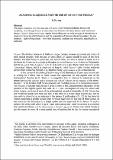Files in this item
Academic eloquence and the end of Cicero's De finibus
Item metadata
| dc.contributor.author | Long, Alexander George | |
| dc.date.accessioned | 2016-02-23T13:10:08Z | |
| dc.date.available | 2016-02-23T13:10:08Z | |
| dc.date.issued | 2015-03-01 | |
| dc.identifier | 136840393 | |
| dc.identifier | aea317e1-61fc-43cb-85d3-4b34fd2fef99 | |
| dc.identifier | 84937003041 | |
| dc.identifier.citation | Long , A G 2015 , ' Academic eloquence and the end of Cicero's De finibus ' , Ancient Philosophy , vol. 35 , no. 1 , pp. 183-198 . https://doi.org/10.5840/ancientphil201535110 | en |
| dc.identifier.issn | 0740-2007 | |
| dc.identifier.other | ORCID: /0000-0001-5838-5490/work/60195618 | |
| dc.identifier.uri | https://hdl.handle.net/10023/8283 | |
| dc.description.abstract | The paper considers why the structure of Cicero’s De Finibus implicitly favours the Academy, even though Cicero avoids a decision between the Stoic theory and Antiochus’ theory. Cicero’s educational aims require him to illustrate not only a range of theories but a range of criteria by which theories and the exposition of theories should be judged. By one criterion – style of exposition – the entire Academic tradition, not Antiochus specifically, is endorsed. | |
| dc.format.extent | 430277 | |
| dc.language.iso | eng | |
| dc.relation.ispartof | Ancient Philosophy | en |
| dc.subject | B Philosophy (General) | en |
| dc.subject | T-NDAS | en |
| dc.subject | BDC | en |
| dc.subject.lcc | B1 | en |
| dc.title | Academic eloquence and the end of Cicero's De finibus | en |
| dc.type | Journal article | en |
| dc.contributor.institution | University of St Andrews. School of Classics | en |
| dc.contributor.institution | University of St Andrews. Centre for the Study of Ancient Systems of Knowledge | en |
| dc.identifier.doi | 10.5840/ancientphil201535110 | |
| dc.description.status | Peer reviewed | en |
This item appears in the following Collection(s)
Items in the St Andrews Research Repository are protected by copyright, with all rights reserved, unless otherwise indicated.

